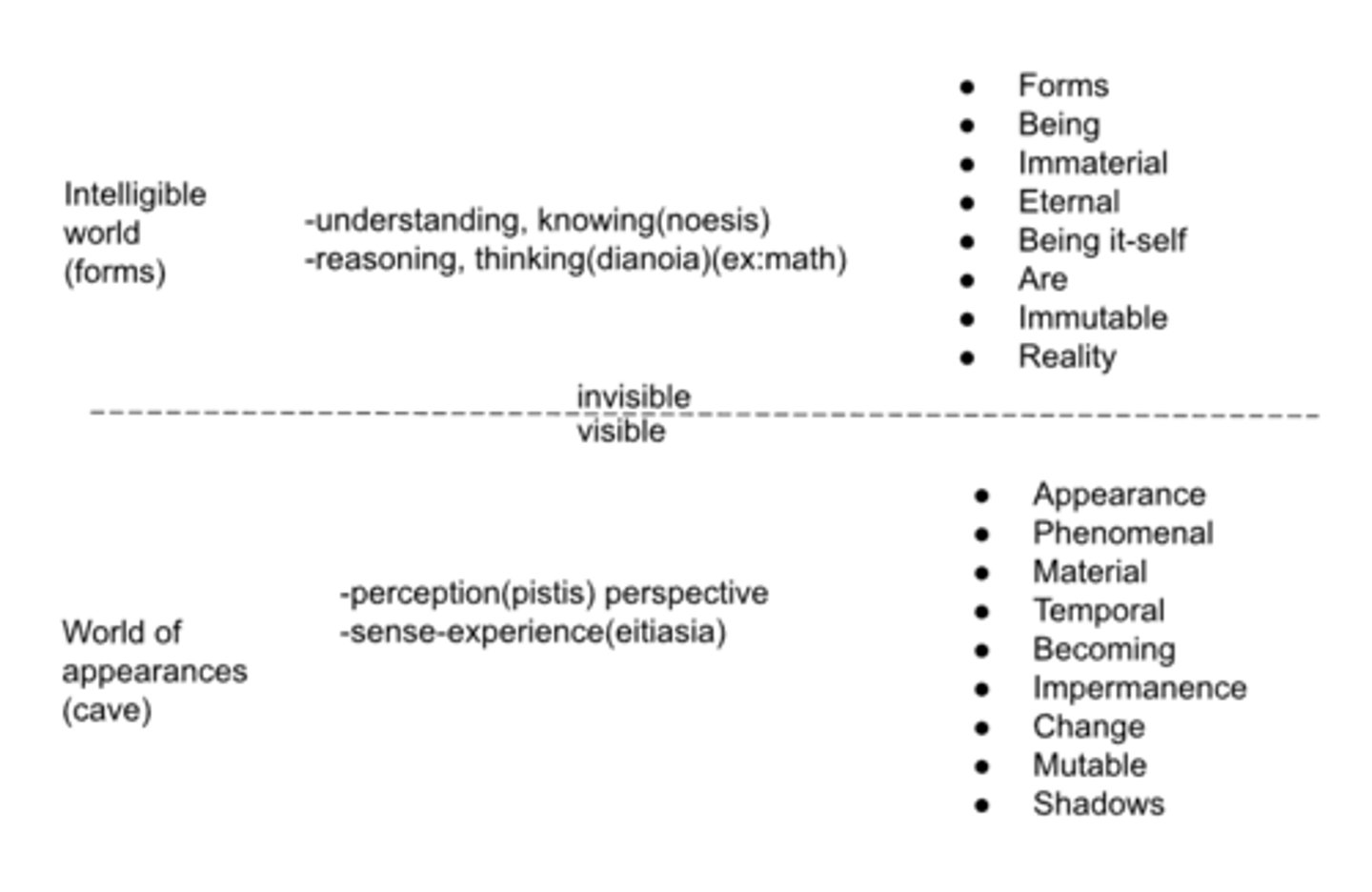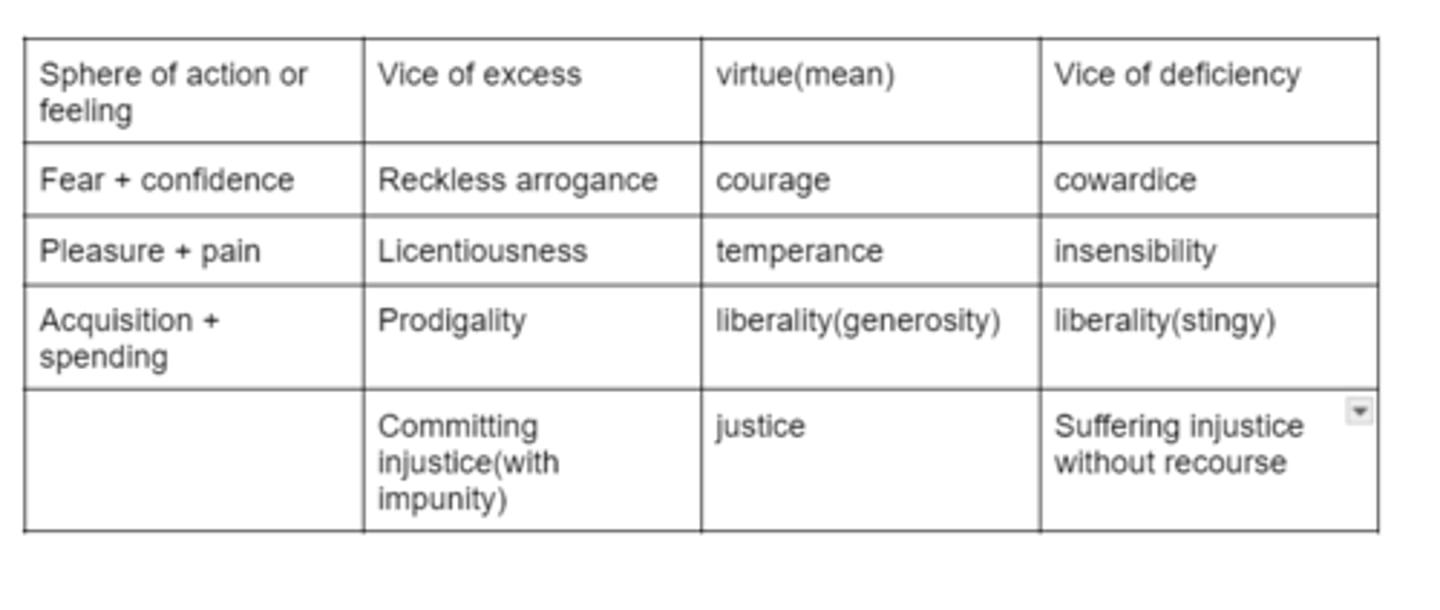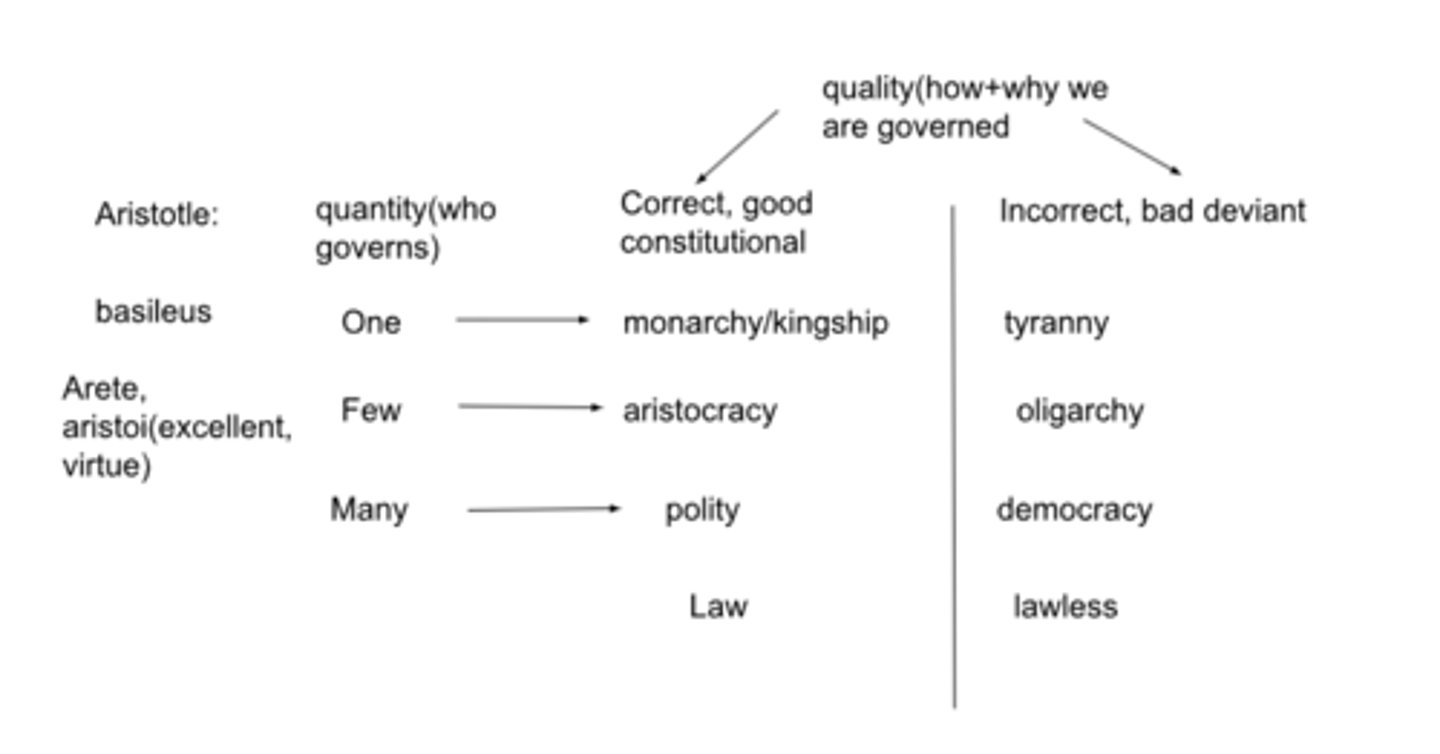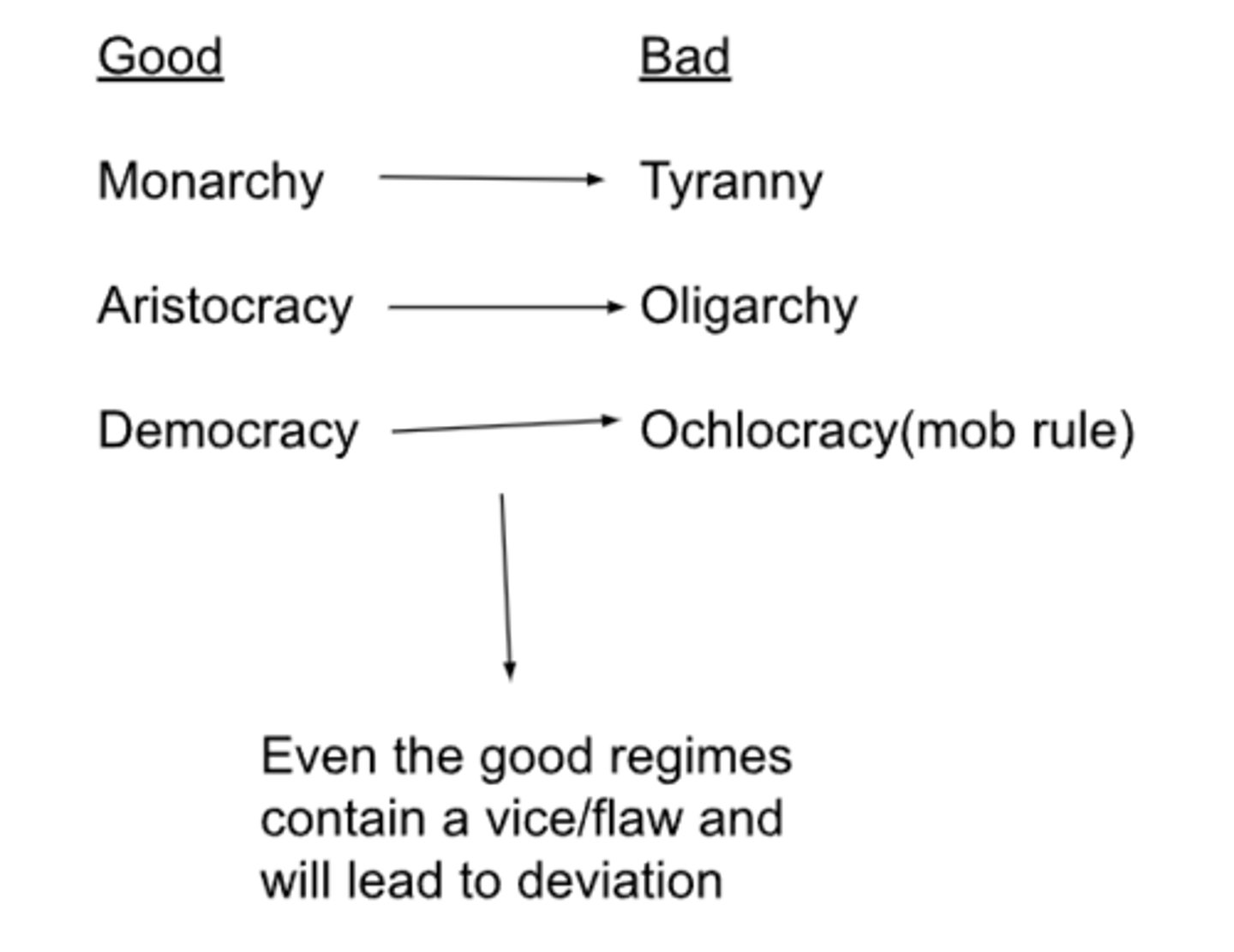posc201 final jmu hammond
1/322
There's no tags or description
Looks like no tags are added yet.
Name | Mastery | Learn | Test | Matching | Spaced |
|---|
No study sessions yet.
323 Terms
Plato/socrates
each highlighted section is a new thinker
What are the two questions raised throughout the conversation in the Republic?
-What is justice?
-What is more profitable/beneficial, justice or injustice?(why be just?)
What are the two models for the study and practice(application) of politics?
-politics in it's essence is about power-Thrasymachus
-politics is essentially about something other than power-socrates
what leads to the conversation about justice?
-Cephalus, polymarchus, Thrasymachus, Glucon, and Socrates talk about money and age
-Cephalus says he is relieved to be old because you can relax
-Socrates says that being rich makes it easier to relax
-Cephalus says that being rich does help, but you still need to be a good moral person
What is justice, according to Cephalus?
Pay debts, be truthful, meet obligations
Socrates reaction to Cephalus's definition
-says definition is not good enough
-its limited and cannot define what justice is in itself
-ex: being truthful is important but sometimes pulling back the truth is not unjust
what is polymarchus definition of justice?
-justice is to do good for friends and harm enemies
-justice is giving what is owed
Socrates reaction to Polymarchus definition
-socrates says you don't always know who your real friends are and your friend may not deserve good
What is socrates definition of justice?
-justice is a virtue of the human soul, a quality of being, an objective principle(not based on conditions), eternal and universal
polymarchus reaction to socrates definition
-says justice relies on outside factors, socrates says no to this. A just person is just to everyone the same way
-socrates says its never just to harm anyone
What is Thrasymachus definition of justice?
-justice is the advantage of the stronger
-justice is a function of power
-justice is determined by those in power
-says a ruler does not make mistakes
What is socrates reaction to Thrasymachus definition?
-socrates says rulers are like doctors. they appear to rule for the sake of others, not themselves, but ultimately they are doing it for their own advantage(ex: money)
Thrasymachus conversation with socrates about just and unjust people
-T says being unjust is more profitable
-a just person gains nothing because of his justice
-T says a tyrant is the most powerful and happiest. injustice on a larger scale is better
-S shows the weakness of injustice
-S says the best people will not rule because they are not motivated by wealth or honor
-good people need to be compelled to rue
good people rule out of necessity
-they rule so bad people dont
-in a truly good community, citizens wouldn't want power
Dikaiosyne
justice, morality
adikia
injustice
pleonexia
outdo, do better, surpass others, have more
Glaucon's definition of justice
-mean between 2 extremes(convention between laws)
-says if people could do it and get away with it, they would be unjust
-says justice is in between the best and the worst
-says injustice is more profitable and nobody is willingly just
-the key is to hold the reputation of being just, while being unjust
-a just person with the reputation of being unjust gains no profit from being just
-shares the story of Gyges
Gyges Story
-a Shepard finds a ring that makes him invisible and he uses it to take over the kingdom
-he could have used it for good, but he used it for his own gain
-behind all the wealth he gained, is great crimes
-he maintains the reputation of being just, while being unjust
socrates view on how to understand justice as it is in itself
-socrates says if you want to understand justice as it is in itself, you need to understand justice in the cities
isomorphic
the city and soul have the same shape
Socrates city in theory
-city of speech, true city, ideal city
-a city "coming to be": nature/necessity/need + function/role
-cities spring from necessity and allow us to fulfill our needs
-we rely on each other
-politics is natural and part of our nature
-aim: "in order to share", people perform their functions because of their nature
Glaucon's objection to the city in theory
-says the city socrates describes is for farm animals
-human beings want more, they want fine things in life
socrates second iteration(the febrile city)
-the city in theory is naturally good/just, but the luxurious city helps you understand how injustice emerges
-febrile city: a fevered city
-the fever is injustice
-the true city is burned by a fever(luxury)
-as the city grows, our wants become bigger than our needs
in true city there is no political power, but once injustice is introduced you need it
The guardians
-a guardians needs to always care for the febrile city and serve it
-like a watch dog
-the guardians need nature and nurture
-the nature of the guardian must be good, but they also need to be able to be trained/educated
myth of the metals
-in all of us, we all have a metaphoric metal
gold
-philosopher rules
-aspect of the soul: rational
-primary cardinal virtue: wisdom
silver
-auxiliary warriors
-aspect of the soul: spirited
-primary cardinal virtue: courage
bronze
-producers/distributors
-aspect of the soul: appetites and desires
-primary cardinal virtue: temperance, moderation, self-mastery, sophrosyne
socrates thoughts on the sophists
-plato says sophists only give the masses what they want and they call it wisdom
-the "huge strong beast"
-the sophists learn how to control the crowds
-the sophists know nothing in reality
-the sophist controls what they say to what the beast wants
-only the philosopher cares about what is actually true
-the rational, spirited rule the appetitive
-the sophists don't care about wisdom or truth
-sophists teach their student to win arguments
-Wisdom are the things that calm and soothe the strong beast
what are socrates reforms for?
-the ideal city is like a virutous soul
-most cities are 2 cities at war with each other
-an ideal city is able to obtain everyones necessary needs(needs + wants)
-febrile cities have unnecessary needs(wants)
-guardians have power but not wealth, producers have wealth but no power
-socrates proposes reforms for guardians
what is socrates first reform?
guardians do not posses private property
platos lesson about the essence of politics according to the first reform
private wealth and political power must be separate
what is socrates second reform?
-men and women share power
-controversial
platos lesson about the essence of politics according to the second reform
-superficial differences are irrelevant
what is socrates third reform?
-sharing of spouses and children
-controversial
platos lesson about the essence of politics according to the third reform
-public good and private interests must be separate
what is socrates fourth reform?
-philosophers should rule
-controversial
platos lesson about the essence of politics according to the fourth reform
-reason should always guide power
true captain
-sailors think they should run the ship(city) but they haven't learned how to navigate yet
-they don't understand that a true captain must know the art of navigating in order to be a captain
-in the eyes of the sailors, the current captain is a 'good for nothing stargazer'(this is the philosophers, they understand there is an art to running a city)
ontology
the theory of being, what is
epistemology
-theory of knowledge, knowing
the divided line/forms
-how humans come to know
-the forms are more real
-as we go up the forms we have a deeper understanding of reality
-eidos: forms(ideas)(types)

Allegory of the cave
-what you see is not all of reality
-all the cave men experience is what is right in front of them(the shadows on the wall), but they do not know they are stuck. It is all they know. What they don't know is behind them
-one is able to escape their chains and see's the fire behind them
-what they thought was real was caused by the fire and reality is more then what they originally thought
-plato is not saying our senses are bad , but if we only rely on our sense we only know a fraction of what is real
-the person who escaped see's another source of light and follows it and finds themselves outside the cave
-cave wall to cave(larger pocket of reality) to whole world(whole reality)
the allegory of the sun
-once he gets outside, the fire is painful to his eyes at first
-outside the cave is the realm of being
-the shadows are real, but it is only an essence or reflection of the real thing
-the philosopher is the one outside the cave
-the man goes back down to tell the other of what he found but they don't believe him
-the philosopher now understands the cave more than anyone else
-plato thinks ideally reason should guide power, but in the cave power guides reason
-the sun is the highest form in the allegory of the cave(the form of the good)
-no matter how bright the fire in the cave is, it will never compare to the sun
-the good makes cardinal virtues possible
-we love wisdom because that draws us to the good
-as beautiful as truth and knowledge are, good is more beautiful
-the forms are more real than material
Where do Aristotle and plato converge
-plato thinks every craft, light of inquiry, and action seems to seek some good
-aristotle agrees with plato but in a different way
-he says he wants to understand the good but not to adopt the forms
-he says you have to disagree with your friends to preserve the truth
-says theres many different ways to think about the good, unlike plato who thinks only about the form of the good
Aristotle's 2 general ways to talk about the good
qualified good and unqualified good
qualified good
-secondary goods
-serve another good
unqualified good
-good in itself
-directive
-primary
-good without further explanation
aristotles four explanatory causes
-material: that "out of which" it is made
-efficient: the source of the objects principle of change or stability
-formal: the essence of the object, what somethings meant to do(ex: formal cause of chalk is to write)
-final(telos): end or aim(ex: the final aim of chalk is to convey knowledge)
epistime politite
-political science
-seeks the good for human beings as a whole
-most controlling science
-highest ruling science
eudaimonia and unqualified goods
-happiness, flourishing, well-being, happiness in accord with virtue
-do not confuse happiness with pleasure, pleasure is a qualified good
-sometimes pleasure can lead to something good, sometimes can lead to not good
-wealth and honor serves happiness
-you can have a lot of wealth and not flourish
-unqualified goods are complete
-the only unqualified good is happiness in accord with virtue
-virtue of character results from habit
-virtue is ruined by extremes
arete
excellence, character, moral virtue
the doctrine of mean

zoon politikon
a human being by nature is a political being
community
-every community is established for the sake of some good
-as individuals no single person is completely self-sufficient, but a complete community can achieve self-sufficiency
-the polis comes to be for the sake of living, it remains for the sake of living well
-we cannot flourish outside the polis
-only beasts or gods can be self-sufficient outside the polis
-human beings are the most savage being when they lack virtue
Aristotle's general qualities of justice
-lawful and fair
-decency
-produces eudaimonia
-complete virtue, aims at another's good
Aristotle's general qualities of injustice(adikia)
-lawlessness
-overreaching(pleonexia)
specific kinds of justice
-proportional(distributed, desert, merit)
-reificatory(corrective, restorative)
-political(legal and natural)
proportional justice
-admits some inequality
-whatever it is your distributing
-social goods that we value as a community like Honor. can be discriminatory based on merit.
reificatory justice
-corrects an inequality
-aims at equality
legal political justice
based upon laws that will vary from place to place
natural political justice
-what is just by nature
-eternal and constant
-physein dikaion
-will not vary from place to place
Aristotles critique of platos city in theory
-excessive unity destroys a city
-plato takes unity too far
-plato's take on unity is more like a household or individuals rather than a city
-plato's description of property is for the guardians, not the entire city and his description is not natural. Guardians care more about private property than shared property(equally neglected)
-Aristotle thinks justice and friendship are essential to political life
-plato says guardians must be friends
-aristotle says plato undermines friendship(when everyone is friends, then friendship is watered down)
-Aristotle says guardians are deprived of happiness and if they aren't happy, how could they govern a city?
Aristotles search for an ideal city

Why is oligarchy, democracy, and tyranny bad
-oligarchy benefits wealthy
-democracy benefits poor
-only rule for private advantage or self-interest(RULE over subjects)
-tyrants rule like masters over slaves. masters are those who rule but cannot be ruled. slaves are those who are ruled but cannot rule
-rule with vice
-rule irrationally
why is monarchy, aristocracy, and polity good
-rule for the common good or benefit(GOVERN citizens)
plato and aristotle express phronesis
-practical wisdom
-to engage in political activity requires common sense and good judgement
monarchs vs tyrants
-monarchs and king have authority but understand that its limited
-tyrants recognize no limits to their authority
-even the best person, without limits, will become a tyrant
-reason must guide power. you aren't going to have philosophers rule, you must have law rule. Law is reason without passion
What is the best regime according to aristotle?
-virtue is always found at the mean and polity is a mean between oligarchy and democracy
-some may look at a polity and call it an oligarchy, while others might call it a democracy, which is proof that it is a blend
-polity is grounded on the principle of friendship
-a citizen is a virtuous being between masters and slaves. One group full of envy(democracy) and one group full on arrogance(oligarchy)
-the middle class provides a buffer between the extremely poor and the extremely wealthy
-free from factions
Regimes according to Plato-laws
-plato says we must rule over ourselves as kings
-anyone can rule if they are clever enough but not every can navigate the ship(problem with democracy)
-there are necessary appetities that are in the city of theory and as the regimes become imperfect, unnecessary appetites arrive

Whats wrong with democracy according to Plato
-assumes all pleasure are equal
-doesnt compel good to rule
-democracys are permissive
-extreme freedom will eventually lead to extreme slavery, which will eventually lead to the worst regime, tyranny
-liberty without license
-appears to be the most beautiful but is not
Platos Athenian stranger
-all other regimes emerge from monarchy and democracy
-monarchy represents authority; can lead to despotism(extreme)
-democracy represents liberty; can lead to anarchy(extreme)(mob rule)
-its essential for a political system to combine monarchy and democracy to avoid the extremes
-good judgement is the benefit of monarchy(phronesis) but if you go towards the extreme you lose good judgement
-freedom and friendship are the benefits of democracy
Second best city
-the stranger says the city of theory is fit for gods but unobtainable for humans. The mixed regime is the "second best city". The city of theory should still be the ideal and we should still resemble our cities after it
-since philosophers can't rule, the laws provide reason. Those who govern us are servants to the law. The guardians are servants
kallipolis
city in theory
magnesia
second best city
socrates arguments about injustice
-says its better to suffer injustice than to commit it
callicles arguments about injustice
-says no man would want to suffer injustice. says socrates world is not realistic
-argues that there is a natural law that socrates is defying
-the strong and few are superior by nature. They should have no problem committing injustice
-callicles says socrates wants us to be more like slaves and controlled by temperance
-think naturally superior people should take what they want
socrates jar metaphor
-say you have a large jar that you fill and seal with a lid. say there is another jar with holes/cracks and the spoon being used to fill the second jar also has holes in it. whatever you try and put into the second jar will leak out and never fill
-the filled jar represents the moderate soul, the appetites are satiate. represents temperance
-the jar with hole represents insatiable appetites. this person is a slave to their appetites
Epicureanism
pink highlights are a new section or philosophy
Overall Epicurus and epicureanism
-you shouldn't worry about things beyond your control
-ataraxia: psych tranquility
-focus on your inner tranquility
-he talks about reputation and appearances(one's own integrity is more important than reputation)
Epicurus first innate good
-pleasure
-enjoy the pleasures of life
-pleasure is the starting point and goal of living blessedly
-pleasures are neutral, no pleasure is better than another
Epicurus on self-sufficiency
-self-sufficiency is a great good
-those who least need extravagance, enjoy it the most
-all pain from want is removed
-when we say pleasure, we do not mean pleasure of consumption, but rather lack of pain and disturbance in the body + soul
Epicurus on prudence
-prudence is the greatest good
-prudence is more valuable than philosophy
-source of all other virtues
-it's impossible to live pleasantly without living prudently, honorably, and justly
Epicurus on politics
-our politics often cause pain + disturbance
-cannot focus on inner-tranquility if society is in turmoil
-a person can achieve self-sufficiency outside the polis
-the wise person avoids politics, but we still need politics
Epicurus on justice
-the just life for him is most free from disturbance in the body and soul
-justice is more like a contract(about neither harming each other or being harmed)
Epicurus on injustice
-if you succumb to injustice, it will damage your soul
-injustice is not a bad thing in its own right
-it's only bad because it's not pleasure
-Epicurus allows the possibility of being unjust
-injustice is only bad if you get caught
Main thinkers of stoicism
-Epictetus
-Seneca
-Marcus Aurelius
-Panaetius
-Cicero
what is stoicism?
-most of stoicism is trying to understand the boundary between fate and freedom
-in spite of fate, there is possibility of free will
-we have to cultivate the virtues to encounter difficulties of life
-thinks politics is essential
-argues you should be loyal to the universe and your country
-cynics influenced early stoics
-stoics say we all belong to the cosmopolis
Cynics
-they think politics should be avoided completely, we need to turn back to nature
-we should become citizens to the world(cosmopolis)
-the cynics were anti-politics and only some are part of cosmopolis
What does Epictetus think?
-somethings are up to us and can be controlled, somethings aren't up to us and can't be controlled
-emotions, opinions, and appetites can be controlled
-bodies possessions, etc. are beyond our control, but we can control our thoughts about them
-we are free in what we can control
-you gain what you desire, so be careful of what you desire
-for the time being, eliminate desire completely
What does Seneca think?
-Seneca says we are all chained to fortune, fate, and necessity. Much of what happens to us is beyond our control
-no situation is so harsh that a dispassionate mind cannot find tranquility
-apatheia: dispassionate
-maintain an even temper, no matter what happens to you
-avoid luxury
-all excesses are luxurious, but modern prosperity is most dangerous of all
jus naturale
natural law
just civile
-civil law
-human law
-positive law
jus gentium
law of human beings
lex
law
Cicero's thoughts on law
-Law is the highest reason in nature
-natural Law is not a product of human thought, but civil law is
-natural Law is the primal and ultimate mind of God
-We are not God, but we share reason with the divine
-those who share Law, must also share natural justice
-Law as right reason -> reason shared by all
-he see's his duty to Rome
-says there's a natural inclination to love our fellow humans
-Cicero adds a quote from Carneades
Carneades
-Carneades is opposed to the ideas of Cicero
-laws are obeyed because of the penalty's they would inflict, not because laws of our own justice
-men are not just by virtue
-there is no natural law, humans are led by their own self-interest
Polybius's typology of regimes
-only solution to not have regimes deviate is to mix regimes
-if you combine elements of the good regimes, that will reduce the chances of the regime becoming corrupt

Cicero's thoughts on regimes
-a composite/mixed regime
-monarchy is the best of the 3 good regimes, but a mixed regime is the best
-Rome is an example of the best city
St. Augustine influences and ideas
-influenced by the Christian faith
-influenced by Cicero and Plato
-two cities: there are 2 kinds of human societies, 2 cities